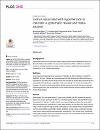| Abstract | Copyright: © 2021 Riaz et al. This is an open access article distributed under the terms of the Creative Commons Attribution License, which permits unrestricted use, distribution, and reproduction in any medium, provided the original author and source are credited. Background High blood pressure is an important public health concern and the leading risk factor for global mortality and morbidity. To assess the implications of this condition, we aimed to review the existing literature and study the factors that are significantly associated with hypertension in the Pakistani population. Methods We conducted several electronic searches in PubMed, ISI Web of Science, PsycINFO, EMBASE, Scopus, Elsevier, and manually searched the citations of published articles on hypertension from May 2019 to August 2019. We included all studies that examined factors associated with hypertension regardless of the study design. To assess the quality of the research, we used the Newcastle-Ottawa Quality Assessment Scale. We also conducted meta-analyses using the DerSimonian & Laird random-effects model to collate results from at least three studies. Results We included 30 cross-sectional and 7 case-control studies (99,391 participants countrywide) in this review and found 13 (35.1%) to be high-quality studies. We identified 5 sociodemographic, 3 lifestyle, 3 health-related, and 4 psychological variables that were significantly associated with hypertension. Adults aged between 30-60 years who were married, living in urban areas with high incomes, used tobacco, had a family history of hypertension, and had comorbidities (overweight, obesity, diabetes, anxiety, stress, and anger management issues) were positively associated with hypertension. On the other hand, individuals having high education levels, normal physical activity, and unrestricted salt in their diet were negatively associated with hypertension. Conclusion We found several socio-demographic, lifestyle, health-related, and psychological factors that were significantly (positively and negatively) associated with hypertension. Our findings may help physicians and public health workers to identify high-risk groups and recommend appropriate prevention strategies. Further research is warranted to investigate these factors rigorously and collate global evidence on the same. |


